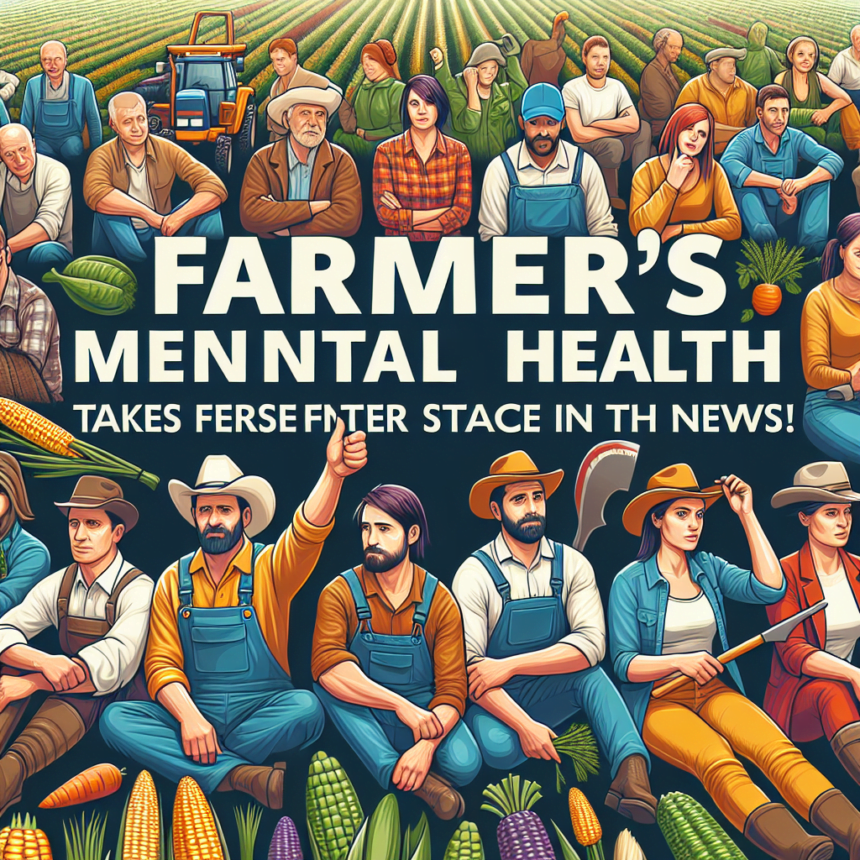Main Points In Hindi (मुख्य बातें – हिंदी में)
यहां पर दिए गए पाठ के मुख्य बिंदु निम्नलिखित हैं:
-
कृषि में आत्महत्या की उच्च दर: अमेरिका में कृषि उद्योग में आत्महत्या की दर आम जनता की तुलना में 3.5 गुना अधिक है, जो मानसिक स्वास्थ्य के महत्व को स्पष्ट करता है।
-
तनाव और मानसिक स्वास्थ्य: कृषि कार्यों में शामिल लोग अक्सर तनावपूर्ण स्थितियों का सामना करते हैं, जैसे खराब मौसम और वित्तीय चुनौतियाँ। यह तनाव व्यक्ति के मानसिक और शारीरिक स्वास्थ्य पर गंभीर प्रभाव डालता है।
-
अवसाद और चिंता: कृषि समुदायों में अध्ययन के अनुसार, 6 से 50% लोग अवसाद के लक्षणों का अनुभव करते हैं और 27 से 71% लोग चिंता महसूस करते हैं, जो एक गंभीर चिंता का विषय है।
-
अवरोध और सहायता प्राप्त करने में कठिनाइयाँ: कई किसान मानसिक स्वास्थ्य सेवाओं तक पहुँच नहीं बना पाते हैं, जिसका एक बड़ा कारण सामाजिक कलंक और सीमित संसाधनों का अभाव है।
- संसाधनों की उपलब्धता: कृषि क्षेत्र में मानसिक स्वास्थ्य को बेहतर बनाने के लिए ऑनलाइन प्लेटफ़ॉर्म और हॉटलाइनों जैसे संसाधन उपलब्ध हैं, ताकि किसान और कृषि श्रमिक अपनी समस्याओं का समाधान कर सकें।
Main Points In English(मुख्य बातें – अंग्रेज़ी में)
Here are the main points derived from the article regarding mental health in the agricultural industry:


-
High Suicide Rates: The agricultural industry in the U.S. has one of the highest suicide rates among all professions, with farmers being 3.5 times more likely to commit suicide compared to the general population, highlighting an urgent need to address mental health issues in this community.
-
Importance of Mental Health: Mental health is defined by the CDC as emotional, psychological, and social well-being, affecting how individuals feel, think, and act. Understanding and maintaining mental health is critical for coping with stress and engaging positively with others.
-
Sources of Stress in Agriculture: Farmers face significant stress due to various factors, including adverse weather conditions, fluctuating market prices, and financial difficulties. These stressors can exacerbate mental health issues, making it essential to identify and manage them effectively.
-
Symptoms of Depression and Anxiety: Recent surveys indicate that a substantial percentage of individuals in agricultural communities experience symptoms of depression (ranging from 6% to 50%) and anxiety (27% to 71%), particularly among younger farmers.
- Barriers to Seeking Help: Many farmers face challenges in accessing mental health resources, including a lack of available providers in their communities and a stigma associated with seeking help. Efforts are needed to normalize conversations about mental health and promote available resources and support systems within the agricultural sector.
Overall, the article emphasizes the critical need for better mental health support and resources for those working in agriculture to mitigate the impacts of stress and improve overall well-being.
Complete News In Hindi(पूरी खबर – हिंदी में)
अमेरिका में कृषि उद्योग में आत्महत्या की दर सामान्य जनता की तुलना में बहुत अधिक है, जहां किसान अपने मानसिक स्वास्थ्य की चुनौतियों से जूझते हैं। नेशनल रूरल हेल्थ एसोसिएशन के अनुसार, किसानों में आत्महत्या की संभावना सामान्य लोगों की तुलना में 3.5 गुना अधिक है। यह दर्शाता है कि मानसिक स्वास्थ्य का महत्व कृषि क्षेत्र में और भी महत्वपूर्ण है।
मानसिक स्वास्थ्य को सी.डी.सी. द्वारा भावनात्मक, शारीरिक और सामाजिक कल्याण के रूप में परिभाषित किया गया है, जो हमारे कार्य करने और तनाव को संभालने के तरीके को प्रभावित करता है। कृषि कार्य कठिन और तनावपूर्ण होते हैं, और इसके कारण कई किसान तनावपूर्ण जीवन स्थितियों का सामना करते हैं, जैसे खराब मौसम, वित्तीय चुनौतियाँ, और बाजार की कीमतों में उतार-चढ़ाव।
इलिनोइस विश्वविद्यालय के प्रोफेसर जोसी रूडोल्फी के अनुसार, किसानों से जब तनाव के बारे में चर्चा की जाती है, तो अक्सर वे अपनी समस्याओं के स्रोत को पहचानते हैं लेकिन मानसिक स्वास्थ्य के साथ उसके संबंध को समझने में कठिनाई महसूस करते हैं। वे जानना चाहते हैं कि तनाव और मानसिक स्वास्थ्य के बीच संबंध क्यों महत्वपूर्ण है। यह आवश्यक है कि लोग तनाव को प्रबंधित करने का तरीका जानें और समझें कि यह उनके स्वास्थ्य पर किस प्रकार प्रभाव डालता है।


हाल ही में किए गए एक सर्वेक्षण में यह पाया गया कि कृषि समुदाय के 6-50% व्यक्तियों ने अवसाद और 27-71% ने चिंता के लक्षणों का अनुभव किया है। विशेष रूप से युवा किसानों में गंभीर अवसाद के लक्षण अधिक देखे गए हैं। इसके अलावा, अध्ययन दर्शाते हैं कि मौसम और समय के अनुसार इन लक्षणों में भिन्नता हो सकती है।
हालांकि कृषि में मानसिक स्वास्थ्य संकट के प्रति जागरूकता बढ़ रही है, फिर भी कई किसानों को सहायता प्राप्त करने में कठिनाइयों का सामना करना पड़ता है। अमेरिकन फार्म ब्यूरो फेडरेशन के अनुसार, 46% किसान और श्रमिक अपने समुदाय में चिकित्सकीय सहायता के लिए पहुँच को कठिन मानते हैं। कई लोग सामाजिक कलंक के कारण मदद लेने में हिचकिचाते हैं।
इस समस्या को सुलझाने के लिए, तकनीकी संसाधन जैसे फार्मस्ट्रेस.ऑर्ग और टेलीफोन हॉटलाइन्स उपलब्ध हैं, जो किसानों को मानसिक स्वास्थ्य और तनाव प्रबंधन के लिए सहायता प्रदान करते हैं। कृषि समुदाय में मानसिक स्वास्थ्य के मुद्दों पर बातचीत करना और इन्हें सामान्य बनाना आवश्यक है।
रूडोल्फी सलाह देते हैं कि अगर कोई किसी साथी की मानसिक स्वास्थ्य के बारे में चिंतित है, तो उन्हें अपनी चिंताओं के बारे में खुलकर चर्चा करनी चाहिए। मानसिक स्वास्थ्य, शारीरिक स्वास्थ्य और तनाव प्रबंधन के विषयों को सामान्य बनाकर इसके कलंक को कम किया जा सकता है। “आप अकेले नहीं हैं” का संदेश फैलाना और संसाधनों का उपयोग करना आवश्यक है ताकि किसान अपने संघर्षों का सामना कर सकें और मानसिक स्वास्थ्य देखभाल की दिशा में कदम बढ़ा सकें।
Complete News In English(पूरी खबर – अंग्रेज़ी में)
The agricultural industry in America has one of the highest suicide rates among all professions, with the National Rural Health Association reporting that farmers are 3.5 times more likely to commit suicide compared to the general public. This alarming statistic underscores the critical importance of mental health within the farming community.
Mental health is defined by the CDC as emotional, psychological, and social well-being. It influences how individuals think, feel, and act, and it determines how they cope with stress and interact with others. According to Josie Rudolph, a professor of agricultural and biological engineering at the University of Illinois, just as everyone has physical health, they also have mental health. Several factors contribute to a person’s mental well-being, with leading causes of poor mental health, according to the Mayo Clinic, including traumatic experiences, brain injury, genetic predispositions to mental illness, and stressful life situations.
Farm work, including both crop and livestock production, is inherently challenging and often leads to stressful life conditions. Farmers frequently face production risks such as droughts, unfavorable weather, fluctuating market prices, and financial or legal challenges, all of which are common sources of stress in the agricultural workforce. Rudolph notes that when discussing stress with farmers, they can often identify the sources of their stress. However, when the conversation shifts to mental health, they may question why the two topics are interlinked. Rudolph explains that stress affects everyone, and it is essential to recognize the relationship between overall health and mental health.
The impact of chronic stress on an individual’s mental and physical health is further supported by a stress model. High levels of stress can lead to various health issues, including fluctuations in blood pressure, symptoms of depression or anxiety, and changes in cortisol levels, a hormone linked to stress. Rudolph emphasizes the importance of addressing the sources of stress and managing it effectively to prevent adverse health outcomes.
Recent surveys conducted by the University of Illinois indicate a concerning prevalence of depression and anxiety symptoms within agricultural communities. Findings show that between 6% to 50% of individuals in these communities reported experiencing depression, and 27% to 71% reported anxiety symptoms. A survey focusing on young farmers in the Upper Midwest revealed that over 60% met the criteria for depression, with 30% to 50% reporting similar findings among adult farmers. Seasonal variations may affect these rates, with winter surveys potentially yielding different results than those conducted in summer.
Despite the mental health crisis in agriculture, many individuals face significant barriers to seeking help. A survey by the American Farm Bureau Federation reported that 46% of farmers and farm workers found it challenging to access mental health professionals in their communities. Rudolph points out the pressing need for more care and resources for agricultural workers, who play a crucial role in the economy yet are often underserved by service organizations. Additionally, the stigma surrounding mental health can deter individuals from seeking professional help due to fear of judgment from their community.
In an effort to reduce stigma, Rudolph encourages open conversations about mental health within the agricultural industry. He suggests that individuals share their experiences and challenges to normalize the discussion and create a supportive environment.
Access to resources is vital, and while many agriculture workers struggle to find mental health care within their communities, modern technology has begun to bridge some gaps. Farmsstress.org specializes in providing resources tailored to agricultural mental health and stress management. Collaboration between the American Farm Bureau and the Farm Family Wellness Alliance has led to the creation of an online peer-to-peer community designed specifically for farmers and ranchers, available at https://togetherall.com/en-us/. This resource is offered free to those connected to agriculture.
Furthermore, telephone hotlines provide immediate, anonymous support for individuals facing mental health challenges. For agricultural, legal, financial, and stress response support, individuals can reach out to the Agricultural Crisis Hotline at 800-447-1985, available year-round. The Suicide and Crisis Lifeline, reachable at 988, is also available 24/7.
Rudolph emphasizes the importance of normalizing the use of such hotlines and resources. He advocates for regular discussions about stress, mental health, and physical health, emphasizing that these topics should be recognized as equally important in the agricultural community. By fostering an environment that prioritizes mental well-being, the hope is to encourage those in agriculture to seek help and support, thereby addressing the higher rates of mental health issues and suicide within this vital industry.
Source link








